Need a place to study or work for free? Try the Quezon City Public Library
If you're looking for a peaceful and quiet spot to study or work, we know a place with fast WiFi, no time limit, and is completely free! You guessed it: a public library.
While neighborhood cafes or co-working spaces in Metro Manila have become the default choice of students and remote workers, you need to pay for at least one coffee or hourly/daily rates for WiFi. Public libraries offer an alternative space to work or study, minus the overpriced coffee and other costs, making it ideal for students and those on a tight budget.
The Quezon City Public Library within the Quezon City Hall complex offers a conducive air-conditioned work environment that anyone can enjoy free of charge. The library is open to the general public, including students and professionals who want to read, study, or work free from distractions.
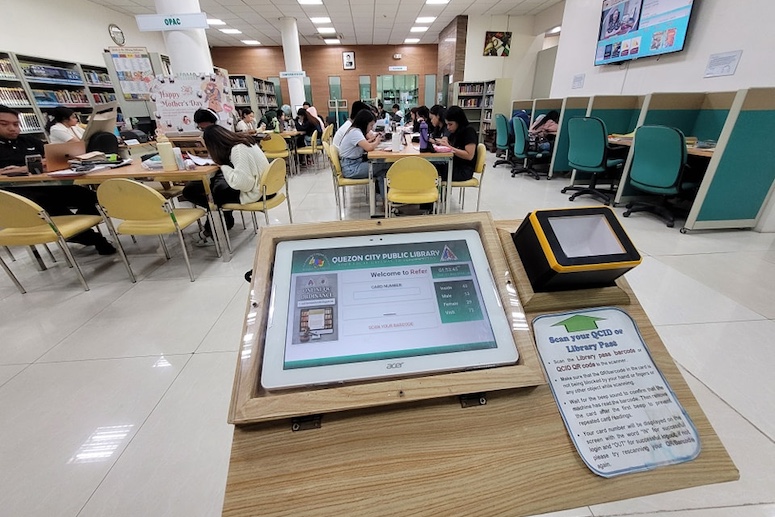
The library also accepts senior citizens, out-of-school youth, children, officials and employees of the city hall, and other individuals, including PWDs who want to spend leisure time reading.
There’s no fee to use the library and walk-ins are allowed. For QC residents, the Quezon City ID, which you can easily apply for online, automatically works as a library card. Non-residents and those who don’t have a QC ID can show another valid ID to get a library pass immediately.
How to apply for a QC Public Library pass
- Fill up a QCPL Registration Form with your name, contact information, guardian (for minors), and waiver
- Register at the main entrance
- Hand out your registration form and valid ID (including school IDs for students) at the help desk
- You’ll be handed a library pass with your name and date (at the back)
- Tap in your library pass before entering
- You are in (there's no limit on the number of hours you can stay)
- Enjoy your stay in the library
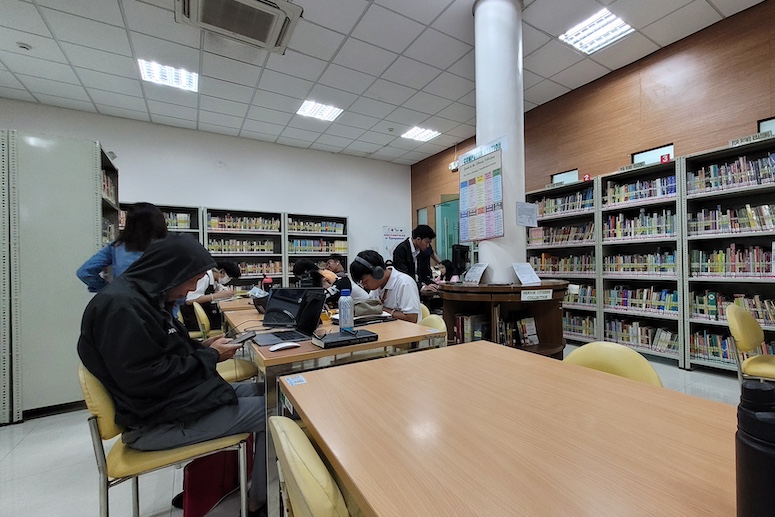
First-hand experience
While the QC Public Library has been around for decades, I admit I’ve overlooked it whenever I run errands at the Quezon City Hall. With the sweltering summer heat, problematic internet at home, and multiple article deadlines looming, I decided to try working here one day and was pleasantly surprised by the experience.
When I arrived in the morning, many students had occupied the main tables, but there were still a few empty seats. The library has a wide collection of books, some magazines, a reference section, a children’s section, a law research unit, Filipiniana and local history collections, and a periodical section. Some computer units connect to the internet while others contain the online bibliographic index for the library collections.
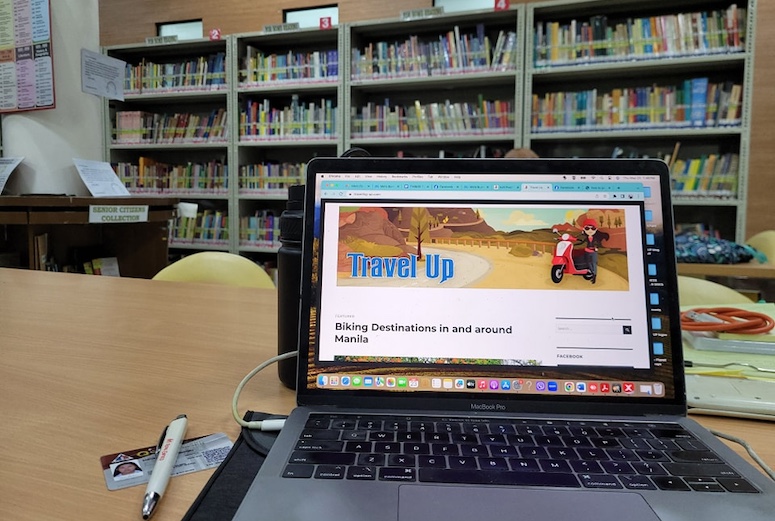
The WiFi was pretty fast. There are sockets near some tables, though these are the most in-demand spots. Since I came a bit early, I was able to find a seat near a plug on the floor. Take note, there’s a minimal fee of P20 per hour for charging laptops and other gadgets.
I savored the blissfully cold air-conditioned space surrounded by books while writing and managed to get a couple of articles done. It was nice to see students and senior visitors alike reading physical books. I felt more productive surrounded by other people quietly studying and working. Overall, it was a pleasant change of scenery from writing at home minus the hefty bill I usually pay in cafes.
The library has an al fresco roof deck cafe on the third floor that serves budget-friendly meals and sandwiches (starting at P35 for a tuna sandwich), instant coffee, noodles, and other basics to tide your hunger. Don’t expect any fancy coffee or pastries here. According to the staff on duty, since most library users are students, they allow visitors to bring their own food and eat it here to help them save costs.
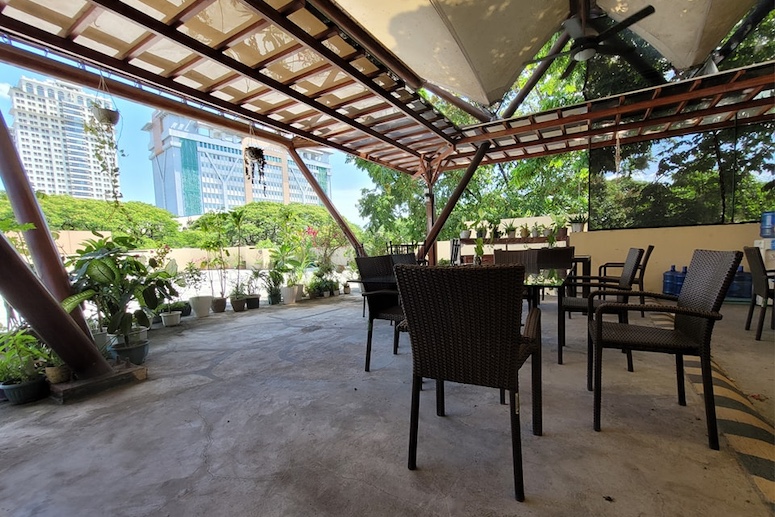
Before leaving, I checked out some other facilities and was impressed to find clean restrooms, a children’s corner, a puppet room, a breastfeeding room, and one area with jigsaw puzzles free for anyone to use and play with, making this an ideal spot for busy working parents as well.
If you’re looking for a quiet and comfy space for your next study or work session and happen to live near Quezon City Hall, the QC Public Library is worth checking out.
Tips before you head to the QC Public Library
- The library has a dress code for visitors. Mini shorts, mini skirts, and revealing clothing are not allowed. Bring a jacket because it gets very cold inside.
- Avoid bringing big bags. Visitors must leave their bags at the baggage counter before entering the library.
- Only bring essentials like cash, credit cards, cellphones, important documents, and other essentials. Do not leave valuables unattended on the tables.
- If you need to use a laptop, you'll need to fill up a separate slip with the name and type of the laptop/gadgets and paraphernalia and submit it to the guard on duty.
- Get a permission slip if you plan to charge a laptop or phone. The charging fee is P20 per hour.
- Bring a reusable tumbler for water. There are multiple water stations located around the library. You can get unlimited refills of water for P15/day.
- Eat before or after you visit the library.
- If you’re the type who needs coffee while writing or studying, bring your own coffee in a flask.
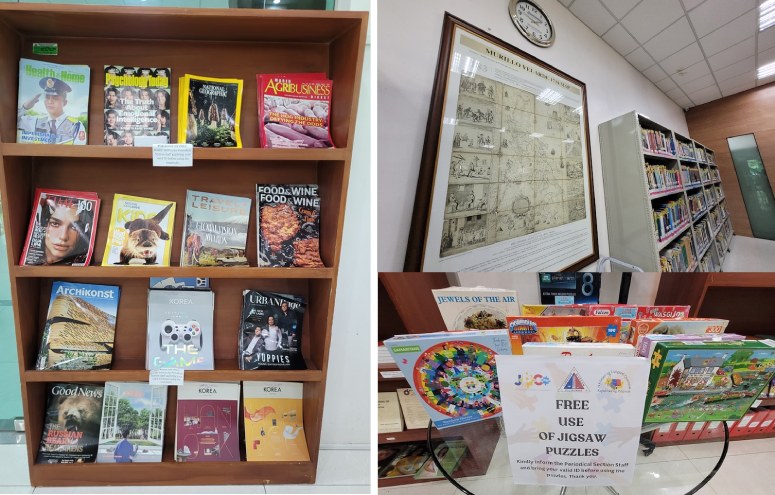
Library hours and branches
The QC Public Library (main branch) is open from Mondays to Fridays from 7 a.m. to 7 p.m. and Saturdays from 8 a.m. to 4 p.m. Aside from the main library, you can also find branch museums all over Quezon City where you can also study and work for free.
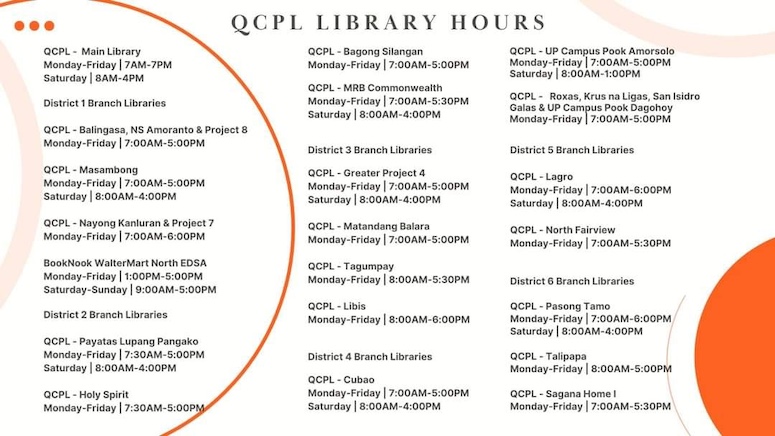
Donate your extra books
Meanwhile, the QC Public Library accepts donations of books and other library materials to expand their collection and serve the reading public. Selected reading materials will be distributed to the main library, branch libraries, and even adopted reading centers.


